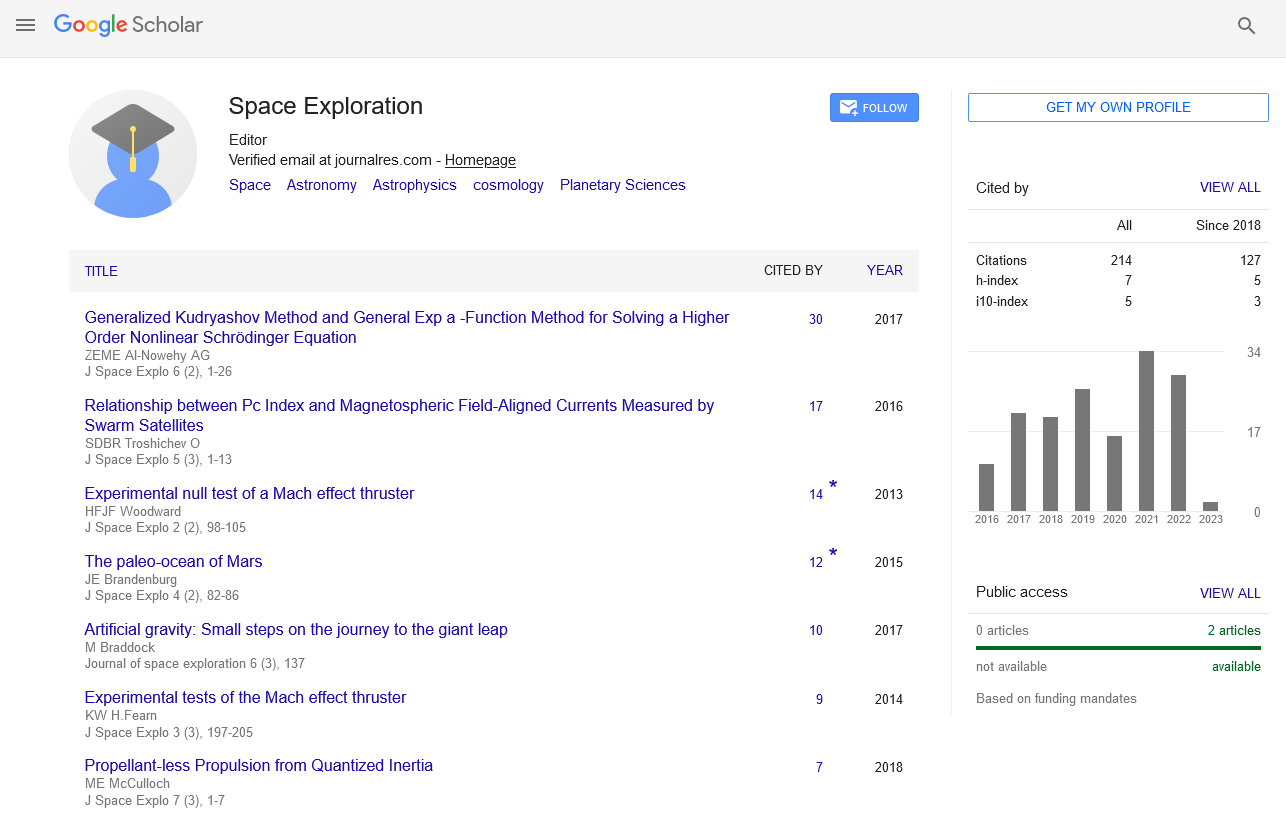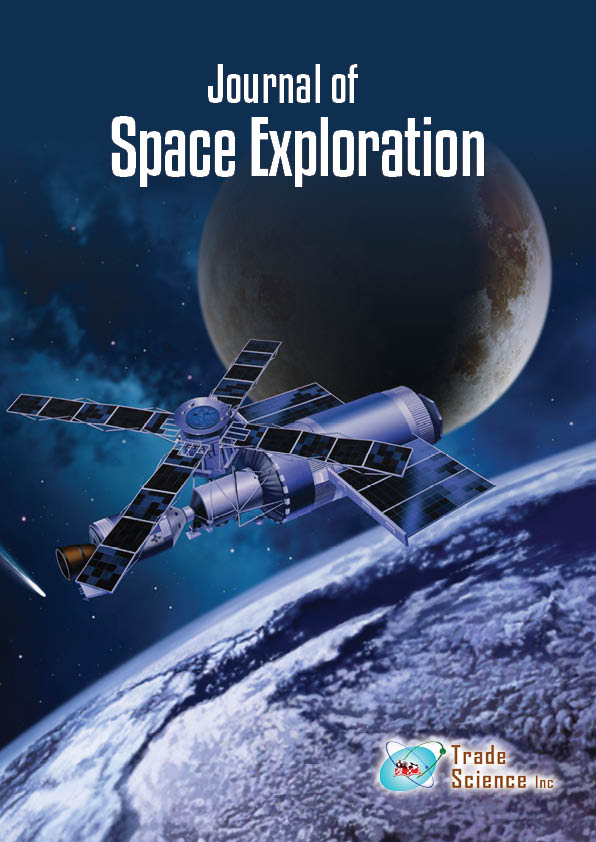Short commentary
, Volume: 11( 6) DOI: doi: 10.37532/2319-9822.2022.11 (6).219Ghana Ecological Risks: An Approach to the Management Frameworks Based on Space Law and Science Education
- *Correspondence:
- Martin RosadoManaging Editor, Journal of Space Exploration, Greenland, Hong Kong E-mail: spaceexploration@scholarres.org
Received: June 3, 2022, Manuscript No. tsse-22-74827; Editor assigned: June 5, 2022, PreQC No. tsse-22-74827 (PQ); Reviewed: June 13, 2022, QC No. tsse-22-74827 (Q); Revised: June 21, 2022, Manuscript No. tsse-22-74827 (R); Published date: June 30, 2022. doi: 10.37532/2319-9822.2022.11 (6).219
Citation: Rosado M. Ghana Ecological Risks: An Approach to the Management Frameworks Based on Space Law and Science Education, J Space Explor.2022; 11(6).219
Abstract
In order to support the creation of legal and scientific education programmes for the management framework of biodiversity and ecosystems, this essay outlines what Ghana must do to advance its space and science education programmes. The article's first section looks at earlier scholarly writing on the subject, which provides numerous hints about Ghana's prospects and problems as well as the things Ghana may learn from other space countries and players. The second section examines information from interviews with experts in the field that were conducted in accordance with ethical standards, while the third section analyses data from a survey in which participants were asked specific questions about Ghana's space and science education programme before summarising the main findings. The results contribute to a better understanding of how biodiversity and the environment interact. Finally, the report makes a number of recommendations for future work, including preserving, maintaining, and protecting biodiversity and the ecosystem, developing a management framework for invasive species and biosecurity, managing environmental degradation and climate change, and ensuring that all communities in Ghana have fair and equitable access to and share in the benefits of biodiversity resources.
Keywords
Sustainable development; Natural resources
Introduction
Ghana found oil and gas in 2007, and production started in the last quarter of 2010. Further research is necessary to determine if the finding of oil and gas absolves these economic activity from the natural resource curse that has persisted. The first impartial discussion on this matter should be on whether Ghana's oil and gas finding helps or hurts the country's economy. The second is whether scientific education and space legislation can support national sustainable development also bring about the plague of dogmatism. The fact that too many resources have a negative effect on economic growth serves as an example of this ideological curse. This investigation focused on the link between natural resources and economic development. The literature on the "natural resource curse" also acknowledges the various variables that influence the link between an abundance of natural resources and economic expansion. These contributing elements, include conflict, lax democratic institutions, and inadequate governance structures. It is sufficient to note that the argument of the "natural resource curse" is only true when the compound element of governance is reduced when a demystification process is in place when looking at nature resources. Regulation, education, and economic activity make up this composite element. To get around a natural resource curse, these factors must be properly balanced. A natural resource is a gift, hence it is important to look at how it is handled. If the lack of oil and gas exploration in Ghana is the cause of this query, then the importance of this problem hasn't gotten much attention in the last 10 years. Although many Ghanaians hailed the finding of oil and gas in their nation, the typical citizen was unaware of the ecological effect and how it would affect their daily life. The long-term ecological effects of oil and gas extraction on the nation are not well understood, despite the economic gains the government has promised. Regulation and education, the first and second components of the compound factor of governance in the context of a natural resource curse, might be held responsible for this failure. Therefore, it is clear that more research is needed to determine if these weaknesses may be corrected by legislation and education. Of again, one may speculate that the enthusiasm around oil and gas extraction may have made people blind to the negative impacts on the ecology. The lack of measurement and analysis of the effects of industrial activity on the greater good by regulation and the science education system is the compound element effect. As a result, a factor that should serve as the foundation for our knowledge of the management framework is the larger good. Understanding the ecosystems' management framework requires integrating scientific education and space law into our daily decision-making processes. This requires examining the social and economic dimensions of Ghana's oil and gas exploration through the lenses of space law and scientific education, given the methodological and practical approach to the problem. Onshore and offshore ecosystems are clearly distinct from one another in the Cape Three Point region. There are about 89 aquatic species in the offshore habitat. In the Jubilee Field, these species may be found in water depths between 1,100 m and 1,700 m. Sandy shorelines that encircle the Cape Three Point area make up the onshore ecosystem. Therefore, we may conclude that space science is necessary to monitor the sites' ongoing growth and that law is necessary to control the behaviour of the people involved in these sites. The Ghanaian ecosystems' management framework ought to be built around this strategy. Consequently, a deeper grasp of the relationship between law and science resolution is necessary for policymakers to appreciate the facilities that are needed to address the challenges surrounding the environment and sustainability. Without this fundamental knowledge, policymakers are unable to create effective instruments that are focused on tackling the issue. Consider the fact that Ghana's whole coastline has over 90 lagoons, the bulk of which are found throughout the central and western coasts, including the Cape Three Points region. These areas support a variety of fish, shrimp, mollusk, and crab species.
Conclusion
Despite the success of GhanaSat-1 and other space activities, it is clear from the discussion of the many opportunities and challenges facing Ghana that more funding and joint public-private sector investment are needed to develop the country's space and science education programmes. Adoption of space laws based on a framework designed to ensure security for both the nation and any potential investors is also essential. More collaboration and coordination between domestic and international players is also required in order to achieve the cohesiveness required for Ghana's space and scientific education projects to be successful, as well as a comprehensive plan to sustain biodiversity and the local ecology.

